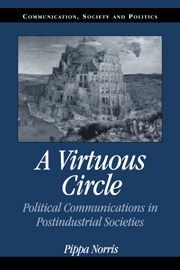Book contents
- Frontmatter
- Contents
- List of Tables
- List of Figures
- Preface
- PART I THE NEWS MEDIA AND CIVIC MALAISE
- PART II TRENDS IN POLITICAL COMMUNICATIONS
- PART III THE IMPACT ON DEMOCRACY
- 9 Negative News, Negative Public?
- 10 Knows Little? Information and Choice
- 11 Cares Less? Cynical Media, Cynical Public?
- 12 Stays Home? Political Mobilization
- 13 American Exceptionalism?
- CONCLUSIONS
- Technical Appendix
- Notes
- Select Bibliography
- Author Index
- Subject Index
11 - Cares Less? Cynical Media, Cynical Public?
Published online by Cambridge University Press: 26 February 2010
- Frontmatter
- Contents
- List of Tables
- List of Figures
- Preface
- PART I THE NEWS MEDIA AND CIVIC MALAISE
- PART II TRENDS IN POLITICAL COMMUNICATIONS
- PART III THE IMPACT ON DEMOCRACY
- 9 Negative News, Negative Public?
- 10 Knows Little? Information and Choice
- 11 Cares Less? Cynical Media, Cynical Public?
- 12 Stays Home? Political Mobilization
- 13 American Exceptionalism?
- CONCLUSIONS
- Technical Appendix
- Notes
- Select Bibliography
- Author Index
- Subject Index
Summary
Much of the concern about the role of the news media in society has been generated by the long-term slide in public confidence in the core institutions of representative democracy, including parliaments, the legal system, and parties. Many accounts have exaggerated the depth and breadth of the problem; there is little evidence of any widespread ‘crisis of democracy’. Yet many postindustrial societies have experienced a growth in the number of ‘critical citizens’. Public faith in democracy as an ideal form of government remains widespread, but at the same time citizens have become increasingly dissatisfied with the performance of representative institutions. This phenomenon may be caused by many factors, including the failure of government performance set against expectations, the growth of new cultural values challenging traditional forms of authority, and problems of institutional effectiveness. Recently, as discussed in Chapter 1, a wide range of journalists and scholars in the United States have blamed the news media for growing public cynicism, while in Europe many believe that the development of professional political marketing by parties has also contributed towards public mistrust. Perhaps an endless diet of stories about government corruption and public sector incompetence, coupled with excessive use of party spin-doctors and glossy television marketing in election campaigns, has eroded public faith in the political process.
We can identify two claims of the media malaise thesis. The weaker version holds that negative news erodes support for specific leaders or policies. For instance, news media criticism may have reduced President Clinton's popularity and affected evaluations of his administration.
- Type
- Chapter
- Information
- A Virtuous CirclePolitical Communications in Postindustrial Societies, pp. 233 - 254Publisher: Cambridge University PressPrint publication year: 2000



